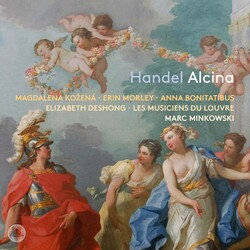Von Händels Oper um die Zauberin Alcina gibt es etliche gute Einspielungen, aber dieser setzt sich mühelos an die Spitze. Die Besetzung ist herausragend und mit Minkowski und Les Musiciens du Louvre steht ein Ensemble zur Verfügung, das die dramatische Musik opulent zu Gehör bringt.
In der Titelrolle brilliert die Mezzosopranistin Magdalena Kozena mit großartiger Technik und Musikalität. Sie kann so alle Facetten und wechselnde Launen der Figur der Alcina mit bravourösen Stimme darstellen: eine superlative Leistung!
Als Ruggiero steht ihr die Mezzosopranistin Anna Bonitatibus gegenüber. Sie singt die schwierige Rolle mit größter Leidenschaft und einer vokalen Projektion, die besser nicht sein könnte.
Morgana, Alcinas Schwester, ist eine weitere wichtige Rolle, und ihr fällt gleich die erste große Arie zu. Die amerikanische Sopranistin Erin Morley hat stimmlich und darstellerisch alles, was sie braucht um uns mit ihrer Interpretation von Anfang an zu fesseln.
Der Figur der Bradamante wird Elizabeth DeShong mit exzellenter Technik und schönem Timbre voll und ganz gerecht.
Die Rolle des Oberto singt der österreichische Countertenor Alois Mühlbacher, und er ist eine wirkliche Überraschung wegen der souveränen Leichtigkeit und der Sicherheit, mit denen er singt. Das ist hochkarätig.
Der Bass Alex Rosen beeindruckt seinerseits mit einer warmen, kräftigen Stimme, die dem Melisso ein gutes Profil gibt. Oronte wird von Valerio Contaldo mit kraftvoller Stimme exzellent dargestellt.
Zu dieser großartigen Besetzung passt das Orchester, das mit federndem Elan und vollem, substanzreichem und warmen Klang präzise und agil spielt. Minkowski verleiht dem Klang eine wunderbare Qualität und Lebendigkeit und er kann so die Sänger optimal unterstützen.
Und somit scheint mir klar zu sein, was ich anfangs schon behauptete: von Händels Alcina ist dies die beste Aufnahme, die gegenwärtig auf dem Markt ist.
There are many good recordings of Handel’s opera about the sorceress Alcina, but this one easily takes the lead. The cast is outstanding and Minkowski and Les Musiciens du Louvre provide an ensemble that brings the dramatic music to lush life.
In the title role, mezzo-soprano Magdalena Kozena shines with superb technique and musicality. She is able to portray all the facets and changing moods of the character of Alcina with a brilliant voice: a superlative performance!
Opposite her as Ruggiero is the mezzo-soprano Anna Bonitatibus. She sings the difficult role with great passion and a vocal projection that could not be better.
Morgana, Alcina’s sister, is another important role, and the first major aria falls to her. The American soprano Erin Morley has everything she needs vocally and dramatically to captivate us with her interpretation from the very beginning.
Elizabeth DeShong does full justice to the character of Bradamante with her excellent technique and beautiful timbre.
The role of Oberto is sung by the Austrian countertenor Alois Mühlbacher, and he is a real surprise because of the confident ease and assurance with which he sings. This is top-class.
For his part, bass Alex Rosen impresses with a warm, powerful voice that gives Melisso a good profile. Oronte is excellently portrayed by Valerio Contaldo with a powerful voice.
The orchestra matches this splendid cast, playing with precision and agility, with springy verve and a full, rich and warm sound. Minkowski brings a wonderful quality and liveliness to the sound, allowing him to support the singers in the best possible way.
And so it seems clear to me what I said at the beginning: this is the best recording of Handel’s Alcina currently on the market.


















